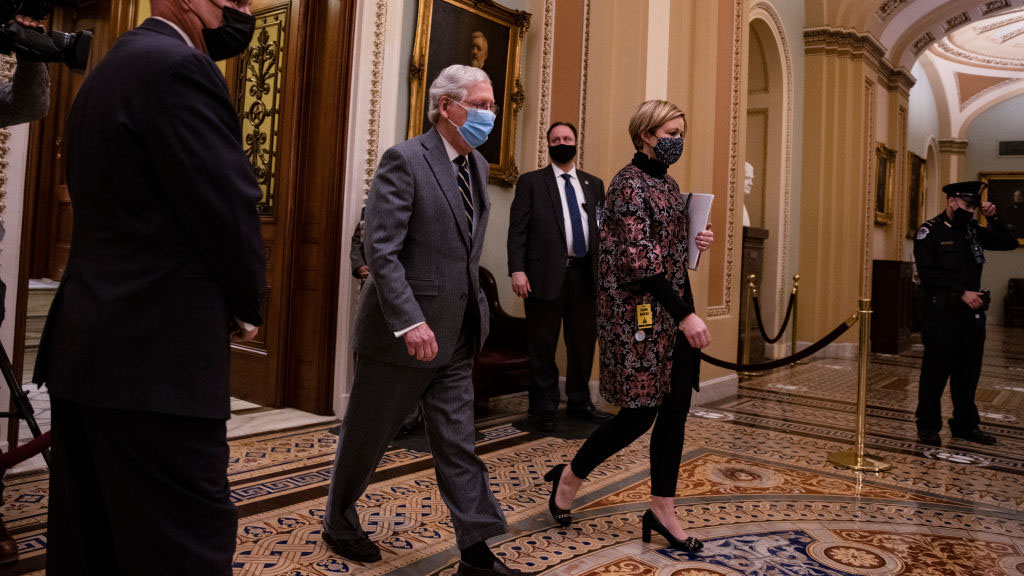The second impeachment trial against former President Donald Trump continues this Thursday in the Senate with another day of arguments.
Trump faces a charge of “incitement to insurrection” in connection with the bloody attack on the Capitol in Washington, DC, on January 6, which left five people dead, several injured and dozens of arrests.
The former president said he will not attend the hearings, rejecting a request from the trial administrators.
On Wednesday, Democrats presented their arguments, which included videos of what happened on Capitol Hill.
The House Democrats, who prosecuted the former president for “inciting insurrection” in his historic second impeachment trial, tried to make it as difficult for any senator to minimize the level of violence, and by extension Trump’s role in it, showing the assault on videos, from various camera angles.
They spent the morning repeating Trump’s words to his supporters before the riots – including his call to “fight like hell” to reverse his defeat – and reconstructed, almost cinematically, the timeline of what happened.
Senate Majority Leader Chuck Schumer (D-NY) and Alaska Republican Senator Lisa Murkowski describe the videos presented by House managers as heartbreaking and disturbing, respectively.
It is not clear if the Democratic presentation will change any votes, as Trump is still expected to be acquitted at the end of the process. But the senators seemed clearly taken aback by what they saw.
As you will recall, on January 13 the House of Representatives voted 232-197 in favor of starting a second impeachment process against Trump, a week after the violence.
Republicans and Trump’s lawyers argued Tuesday that the trial is unnecessary, and even unconstitutional, because Trump is no longer president and cannot be removed from office, but Democrats approved 56-44 to go ahead with the hearings, with the vote of six Republicans.
Second day of impeachment against former President Donald Trump, and Democrats presented new evidence. They also armed themselves with other images and tweets of the former president that they say incited his group of supporters to an insurrection.
The trial is chaired by Senator Patrick Leahy, a Vermont Democrat, who is the Senate’s ceremonial chief for having been the longest-serving majority party member in service.
Once the senators reach a final vote on the impeachment charge – this time there is only one: incitement to insurrection – each legislator will stand up and cast their vote: guilty or innocent.
Trump’s first impeachment trial, in which he was acquitted of charges of abuse of power by pressuring Ukraine to investigate now-President Joe Biden, lasted nearly three weeks.
Several have been the presidents who have fallen from grace.
But this is expected to be shorter, as the case is less complicated and senators already know many of the details, having been on Capitol Hill during the insurrection themselves.
And while Democrats want to make sure they have plenty of time to present their case, they don’t want to paralyze the Senate for long.
Until the trial is complete, the Senate cannot confirm Biden’s cabinet nominees and move forward with its legislative priorities, such as relief from the COVID-19 pandemic.
The former president faces a charge for “incitement to insurrection.”
If Trump is found guilty, the Senate could hold a second ballot to bar him from holding office again. Democrats believe it would be an appropriate punishment after he told the angry crowd of his supporters to “fight like hell” to reverse his electoral defeat.
Democrats also argue that there should not be a “January exception” for presidents who commit chargeable crimes just before leaving office. They say the trial is necessary not only to properly hold Trump accountable, but also so that they can deal with what happened and move on.
“You can’t move on until justice is served,” House Speaker Nancy Pelosi said this week. “If we don’t continue with this, we could also remove any sanction from the Constitution of impeachment.”
Former President Donald Trump’s top lawyer in his impeachment trial before the US Senate, Bruce Castor, surprised senators on Tuesday with an opening speech that was more of a rambling with no clear direction or argument, which made him trending on Twitter.
Recent memories from Jan.6 might make it easier for prosecutors to lay out their case, but it doesn’t mean the outcome is different from the first trial against Trump.
The then president was acquitted in his first trial a year ago with just one Republican – Utah Sen. Mitt Romney – voting in favor of finding him guilty, and it is possible that this time there will not be many votes in that regard either.
In a test vote on January 26, only five Senate Republicans voted against an attempt to dismiss the trial, an early indication that Trump is likely to be acquitted again.
David Schoen, who had requested that the trial not take place on Saturday in order to observe that day (a request he later withdrew), said that he normally wears a kippah (which is traditionally worn when eating, praying or studying the Jewish text) , but “I just wasn’t sure if it was appropriate.”
A second impeachment acquittal by the Senate would be a victory for Trump, and would demonstrate that he retains considerable influence over the Republican Party, despite his efforts to subvert democracy and widespread condemnation from many Republican colleagues after the 6th. from January.
Still, acquittal may not be the end of attempts to hold you accountable.
Senators Tim Kaine, D-Virginia, and Susan Collins, R-Maine, filed a vote of no confidence after last month’s vote made it clear that Trump was unlikely to be found guilty.
While they have not yet said whether they will push for a no-confidence vote after impeachment, Kaine said this week that “the idea is on the table and may become a useful idea in the future.”

